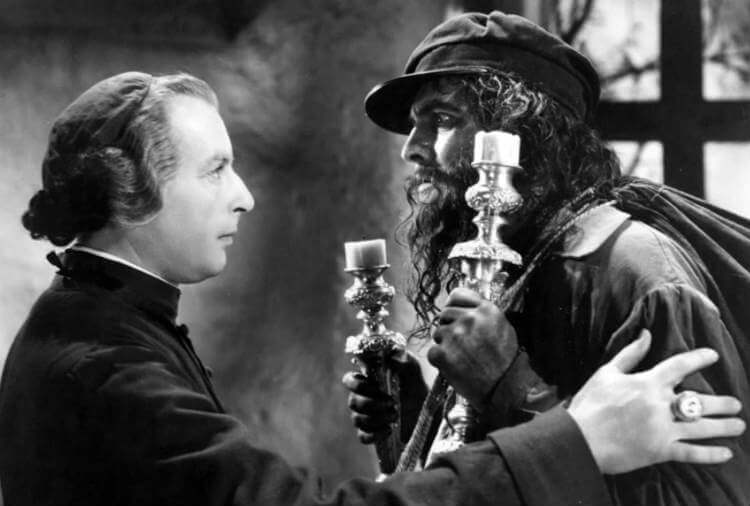Les Misérables is Victor Hugo’s fictional masterpiece on law versus grace and the power of redemption. It has been adapted for the screen several times. In fact, the latest adaptation is set to air on PBS very soon. I was fortunate enough to see the stage play on Broadway and it’s one of my favorite musicals. I’ve also seen the 1998 and 2012 feature films, which I thought fell a bit short in capturing the soul of the story I saw on stage. So, when the opportunity arose to view the first big screen adaptation made, of course, I had to compare.
RELATED: Seven Shakespeare Adaptations Lovers of the Bard Should Check Out
In its book form, Les Misérables is over 1300 pages. As anyone who has ever seen a film adapted from a book will tell you, it’s impossible to portray every character, storyline, and theme in a novel. Cuts must be made for the sake of time, but the main points can still be conveyed. Fortunately, I feel that this version captures the heart of the story and the soul of the characters beautifully.
LES MISERABLES SUMMARY

Photo: Public Domain
Our tale is set in nineteenth-century France. The iconic story begins when Jean Valjean receives an unjust prison term for a minor offense. While in prison, he comes into contact with the merciless Javert who eventually becomes a policeman. Then, after his release, he encounters a compassionate priest who challenges him to show the same mercy he has given Valjean. This one act of compassion and forgiveness changes the course of his life. From that point on, Valjean assumes a new identity and leads an exemplary life. His financial success allows him to be generous with others, but from a distance.
Then another life-changing encounter occurs when Fantine, a young woman fired from his factory, dies and leaves her young daughter behind. At the same time, the rigid Javert has been searching for Valjean for a long time over another infraction of the law. Soon, Valjean is barely able to escape with his new daughter Cosette. They head to Paris where they hide out for many years.
RELATED: Pride and Prejudice (1940) Film Review – Adaptation of Austen’s Classic Love Story
Years later, a grown Cosette falls in love with the young revolutionary Marius. Marius’ group is under surveillance by none other than Javert. This brings Valjean and Javert into one last confrontation with a surprising ending.
REVIEW
Fans of the novel can find much to critique about this Les Misérables. Major cuts have been made to the story and some changes have been made to what remains. The most glaring changes are in the last third of the film. Marius’ group is no longer revolutionaries but law students who are protesting the injustice of the law. The tragic Eponine serves as the group’s secretary. The beloved character of the street urchin Gavroche, who tragically perishes, doesn’t exist in this adaptation.
Moreover, fans of other film versions may find fault with the theatricality of the production. Also, many of the scenes occur on studio built sets instead of on location. However, none of these minor complaints detracted from my experience of this film.
I was also concerned that the lack of music in this movie, might detract from my enjoyment of it. It is after all one of my favorite musicals. But I was pleasantly surprised to find that this lack actually enhances the story. It allows the focus to remain on the themes and the characters, giving a greater impact on their journey. In fact, I’m now of the opinion that the music (as much as I love it) detracts a bit from the character performances in the other films.
TWO STUNNING PERFORMANCES
The main selling point of this Les Misérables is the performances of the two main leads. Frederic March plays Valjean with great empathy. His physical transformation from prisoner to mayor is remarkable. March also excels at transmitting Valjean’s internal thoughts and emotions through small changes in body language as well as through the eyes. His subtle style of acting really serves the character well.
Charles Laughton’s interpretation of police investigator Javert may be the best I’ve seen. He brings a controlled intensity to the role which is almost hypnotizing. He sees himself as a servant of the law and his devotion to upholding it is sincere. There is no malicious intent in his pursuit of Valjean because he simply sees it as his responsibility. Javert is devoid of almost any real human emotion which is his biggest weakness. There is no distinction for him between the spirit of the law and the letter of the law. The law is the law. Laughton’s portrayal of this automaton is all in the eyes which burn with his conviction. It’s really stunning.
CONCLUSION
I’m not alone in my opinion that this Les Misérables adaptation is well-done. It received four Oscar nominations including one for best picture and one for cinematography. Remarkably, there were no nominations for the actors, but there should have been. The purity of the performances makes this version memorable. Fans of Les Misérables owe it to themselves to see this interpretation.
Content Note: There are a few depictions of mild violence, but nothing else.
Where to Watch: Rent from Amazon and Youtube. Purchase on DVD.
Have you seen Les Misérables? Do you have a favorite adaptation?
Top Photo Credit: Twentieth Century Pictures/United Artists
OVERALL RATING

“Hello, Gorgeous.”
ROMANCE RATING
“Happiness in marriage is entirely a
matter of chance.”
ARE YOU A ROMANCE FAN? FOLLOW THE SILVER PETTICOAT REVIEW:
 Our romance-themed entertainment site is on a mission to help you find the best period dramas, romance movies, TV shows, and books. Other topics include Jane Austen, Classic Hollywood, TV Couples, Fairy Tales, Romantic Living, Romanticism, and more. We’re damsels not in distress fighting for the all-new optimistic Romantic Revolution. Join us and subscribe. For more information, see our About, Old-Fashioned Romance 101, Modern Romanticism 101, and Romantic Living 101.
Our romance-themed entertainment site is on a mission to help you find the best period dramas, romance movies, TV shows, and books. Other topics include Jane Austen, Classic Hollywood, TV Couples, Fairy Tales, Romantic Living, Romanticism, and more. We’re damsels not in distress fighting for the all-new optimistic Romantic Revolution. Join us and subscribe. For more information, see our About, Old-Fashioned Romance 101, Modern Romanticism 101, and Romantic Living 101.

